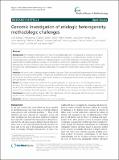Genomic investigation of etiologic heterogeneity: methodologic challenges

View/
Author
Begg, Colin B
Seshan, Venkatraman E
Zabor, Emily C
Furberg, Helena
Arora, Arshi
Shen, Ronglai
Maranchie, Jodi K
Nielsen, Matthew E
Rathmell, W Kimryn
Tamboli, Pheroze
Karam, Jose A
Hakimi, A Ari
Hsieh, James J
Note: Order does not necessarily reflect citation order of authors.
Published Version
https://doi.org/10.1186/1471-2288-14-138Metadata
Show full item recordCitation
Begg, C. B., V. E. Seshan, E. C. Zabor, H. Furberg, A. Arora, R. Shen, J. K. Maranchie, et al. 2014. “Genomic investigation of etiologic heterogeneity: methodologic challenges.” BMC Medical Research Methodology 14 (1): 138. doi:10.1186/1471-2288-14-138. http://dx.doi.org/10.1186/1471-2288-14-138.Abstract
Background: The etiologic heterogeneity of cancer has traditionally been investigated by comparing risk factor frequencies within candidate sub-types, defined for example by histology or by distinct tumor markers of interest. Increasingly tumors are being profiled for molecular features much more extensively. This greatly expands the opportunities for defining distinct sub-types. In this article we describe an exploratory analysis of the etiologic heterogeneity of clear cell kidney cancer. Data are available on the primary known risk factors for kidney cancer, while the tumors are characterized on a genome-wide basis using expression, methylation, copy number and mutational profiles. Methods: We use a novel clustering strategy to identify sub-types. This is accomplished independently for the expression, methylation and copy number profiles. The goals are to identify tumor sub-types that are etiologically distinct, to identify the risk factors that define specific sub-types, and to endeavor to characterize the key genes that appear to represent the principal features of the distinct sub-types. Results: The analysis reveals strong evidence that gender represents an important factor that distinguishes disease sub-types. The sub-types defined using expression data and methylation data demonstrate considerable congruence and are also clearly correlated with mutations in important cancer genes. These sub-types are also strongly correlated with survival. The complexity of the data presents many analytical challenges including, prominently, the risk of false discovery. Conclusions: Genomic profiling of tumors offers the opportunity to identify etiologically distinct sub-types, paving the way for a more refined understanding of cancer etiology. Electronic supplementary material The online version of this article (doi:10.1186/1471-2288-14-138) contains supplementary material, which is available to authorized users.Other Sources
http://www.ncbi.nlm.nih.gov/pmc/articles/PMC4292824/pdf/Terms of Use
This article is made available under the terms and conditions applicable to Other Posted Material, as set forth at http://nrs.harvard.edu/urn-3:HUL.InstRepos:dash.current.terms-of-use#LAACitable link to this page
http://nrs.harvard.edu/urn-3:HUL.InstRepos:13890700
Collections
- HMS Scholarly Articles [17922]
Contact administrator regarding this item (to report mistakes or request changes)


